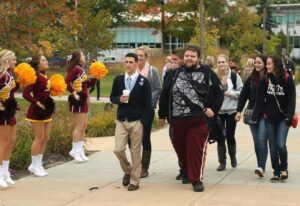
ReUp Success Coach Miguel Olivera shares his experiences with academic struggle and explains the importance of authenticity.
by Meilee D. Bridges
Miguel Olivera is no stranger to the proverbial concept of best-laid plans going awry. As a new Success Coach at ReUp Education, Miguel has found his niche helping students explore strategies for achieving their goals. But his journey to his current destination has certainly included some twists and turns, hills and valleys. “I know the struggles I had with returning to school,” he says. “So when I talk to a student and they leave our communication feeling like, OK, I know what I need to do next or I can do this, that’s what it’s about.”
“So when I talk to a student and they leave our communication feeling like, OK, I know what I need to do next or I can do this, that’s what it’s about.”
The challenges of not being “a great student”
Miguel hails from Dearborn Heights, Michigan, about 25 minutes west of Detroit. He attended D7 (District 7) public schools and eventually landed at Central Michigan University (CMU), where he would eventually become the first in his family to earn a bachelor’s degree. “I always assumed I was going to college, and I think my parents did, too, but there wasn’t any real pressure that I can think of,” he recalls. “It was kind of like, This is what you do.”
As he started taking classes at CMU, he decided to double major in accounting and finance, envisioning a career in accounting after college. I’m good at math, he remembers thinking, and the accounting class I took in high school was super easy—and I want to make money, he adds with a chuckle. Accounting didn’t stick, though, so he switched to marketing. He finished three years of business classes, including the business capstone course—the most difficult of the program. His seminars in business law were fun, and he balanced out his major with an English minor, but something still wasn’t quite right; his major just didn’t seem like the right fit.
I can’t do this for 40 years! he realized during his junior year.
So after discussing it with his academic advisor, Miguel swapped his courses of study, majoring in English with a focus on creative writing and converting business to his minor. Still, Miguel recalls struggling with motivation in some of his classes. He was no fan of buying expensive textbooks and didn’t have a great interest in some of the readings for his literature courses. He also admits to not being very organized. “I was never a great student,” he describes. “I’m smart, but just the general classroom stuff . . .” He pauses to groan from the memories. “I’m decent at retaining but not so much at studying. . . . Education is so very rarely tailored to your learning style.”
The (academic) struggle is real
Nevertheless, Miguel persevered to graduation, even if his initial plans shifted substantially along the way. During his junior year, he had also signed on to be a resident assistant (RA), coordinating social activities in his residence hall, mentoring younger students, and enforcing campus policies. The role would shape his path after college: he decided to continue his education by pursuing a master’s in higher education and student leadership.

Originally thinking he would follow a master’s with a Ph.D. and become an academic, he moved 14 hours from home to begin his graduate coursework at a university in Georgia. The move from his home state of Michigan to the deep South resulted in substantial culture shock. Another barrier to his educational experience was that his new school imposed strict expectations on Miguel’s grades—an academic probation of sorts—because he had graduated from CMU with a GPA that was, as he describes it jokingly, “low enough that it wasn’t recommended that I put that on my résumé.” He found his coursework frustrating and anxiety provoking at times because the theories of student support he was learning were sometimes outdated or at odds with his personal values. And as almost any graduate student will tell you, living paycheck to paycheck on graduate-assistant wages, even with his housing paid for by the university, was often stressful.
The most significant challenge of his graduate experience, however, was when Miguel was placed on academic suspension for several months because he earned Cs in three of his classes. The impact was multifold: because his enrollment was suspended and his job depended on that enrollment, he lost his graduate assistantship. Losing his university position meant he was no longer eligible for on-campus housing, so he was forced to move back home to Michigan.
An unexpected interruption in school
That devastating experience soured Miguel on graduate school and his plan of continuing his education beyond his master’s. He sighs frequently as he recounts the difficulties of being forced to take a break from school, delaying his degree and his ability to get a job in his field. “I felt a lot of internalized pressure because I had failed out of grad school at this point, I felt like a loser, I didn’t have a job, and I wasn’t doing much,” he reflects. He made ends meet by working as a Lyft driver, but it was admittedly a rough period of his life.
Navigating the return to school and having to complete his master’s hundreds of miles away from his graduate institution were similarly painful. He eventually earned his degree by taking online courses, but he states firmly that he “did not like that” last semester of distance learning.
“I am happy where I am now. I do recognize that that was an experience that’s led me to where I am right now,” he shares. “It would have been nice if there’d been other ways to get here,” he adds with a dry laugh.
“I’m here to help you through the readmission process and help you feel like you’re prepared and empowered to take on your collegiate journey. I’m in your corner to support your growth and explore different strategies with you to get you to your goals.”
After much frustration and finally earning his master’s in fall 2017, Miguel caught his first big break when he accepted the post of Residence Life Coordinator working with first-year students at Penn State University. “The first two years, I loved it,” he remembers.
Of course, as rewarding as the job was, it understandably came with plenty of challenges. “If you’ve ever had to wake up at 4:00 in the morning because some 18-year-old doesn’t understand how their door opens, that kind of thing happens at the same time that you get a call because a student is getting transported for alcohol poisoning,” he says ruefully. “Anything that you can imagine that could negatively go wrong in a student’s life, I have been there for.”
Empowering students for their educational journey
Being part of students’ support system was a fulfilling aspect of his work in residence life, and it eventually led Miguel to seek his current position as a Success Coach at ReUp, where he has been engaging with adult learners since September 2021.
Defining his role is often the first conversation he has with his students because many do not associate the notion of a coach with any field beyond sports. So Miguel describes his work as a Success Coach in this way: “I’m here to help you through the readmission process and help you feel like you’re prepared and empowered to take on your collegiate journey. I’m in your corner to support your growth and explore different strategies with you to get you to your goals.”

Miguel loves engaging with adult learners. He also appreciates the safe space ReUp provides for them to explore their motivations, their values, and the factors that affect their success. “Very rarely in our adult life do we get asked, ‘Why do you want to go to college? Why do you want to get your degree? What is that going to do for you?’” he says.
He adds that coaching allows students to be heard by someone who cares and to get the guidance they need without judgment. “How many of us have spoken to a loved one, . . . where you’re just saying something about your life, and it turns into a lecture?” he says. “That’s just not going to happen with coaching.” Instead, students can share their disappointments and aspirations with confidence, knowing that their Success Coach will listen and offer the kind of unbiased support that isn’t always available when seeking advice from friends or family.
Having been forced to take a break from school himself means Miguel deeply empathizes with the challenges and strong emotions associated with returning to higher education—or even just making the decision to go back. He believes that distinction is key: “as coaches,” he clarifies, “we don’t just work to get you through applying and graduation. We also work with you to see if now is a good time for you to go back to school. And even if it’s not, we’re still here for you.”
“We don’t just work to get you through applying and graduation. We also work with you to see if now is a good time for you to go back to school. And even if it’s not, we’re still here for you.”
Miguel looks forward to helping students during the many text, phone, and email conversations that lie ahead. His advice for students in the ReUp community is to be honest and to be yourself. “Come in as your authentic self because that’s how you’re going to get the most out of this,” he explains. “That’s how you’re going to find out what it is that you really want, whether it’s from the coaching relationship [or from] your potential academic career. I think in most things in life, it’s just best to be your authentic self.”



